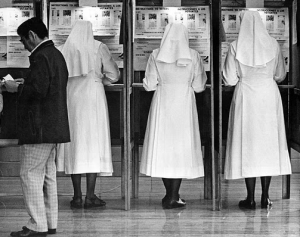Do Nuns Vote Differently Than Lay Catholics?
Do Nuns Vote Differently Than Lay Catholics?

 A couple of weeks ago, I wrote an article about how Hillary Clinton’s campaign manager had set up two dummy Catholic organizations for the sole purpose of undermining the Catholic church. After the article was published, several people asked me if the Catholic Church has any definitive guidelines for Catholic voters.
A couple of weeks ago, I wrote an article about how Hillary Clinton’s campaign manager had set up two dummy Catholic organizations for the sole purpose of undermining the Catholic church. After the article was published, several people asked me if the Catholic Church has any definitive guidelines for Catholic voters.
The most recent guidelines that are available were published in November 2015 by the United States Conference of Catholic Bishops (USCCB). The guidelines were included in the document, Forming Consciences for Faithful Citizenship: A Call to Political Responsibility. The document was developed by the chairman of the USCCB in consultation with 11 different USCCB committees.
Paragraphs 34 and 35 of the USCCB faithful citizenship document are directly relevant to voting:
34. Catholics often face difficult choices about how to vote. This is why it is so important to vote according to a well-formed conscience that perceives the proper relationship among moral goods. A Catholic cannot vote for a candidate who favors a policy promoting an intrinsically evil act, such as abortion, euthanasia, assisted suicide, deliberately subjecting workers or the poor to subhuman living conditions, redefining marriage in ways that violate its essential meaning, or racist behavior, if the voter’s intent is to support that position. In such cases, a Catholic would be guilty of formal cooperation in grave evil. At the same time, a voter should not use a candidate’s opposition to an intrinsic evil to justify indifference or inattentiveness to other important moral issues involving human life and dignity.
35. There may be times when a Catholic who rejects a candidate’s unacceptable position even on policies promoting an intrinsically evil act may reasonably decide to vote for that candidate for other morally grave reasons. Voting in this way would be permissible only for truly grave moral reasons, not to advance narrow interests or partisan preferences or to ignore a fundamental moral evil.
Of the six acts that are set forth in paragraph 34 that Catholics are asked to consider when voting, three of them are objective acts that are not open to interpretation. The three acts I’m referring to are abortion, euthanasia, and assisted suicide.
An objective act is an act that is fact-based, measurable, and observable. Abortion, euthanasia, and assisted suicide, are fact-based, measurable, and observable acts that have specific definitions that are not open to interpretation or opinion. While there are people who believe that it’s okay to commit one or more of these acts, they cannot deny the objective nature of each of the acts.
The other three acts that are set forth in paragraph 34 are subjective acts that are open to interpretation. Paragraph 34 listed those acts as “deliberately subjecting workers or the poor to subhuman living conditions, redefining marriage in ways that violate its essential meaning, and racist behavior.”
A subjective act is an act that is based on opinions, emotions, interpretations, personal feelings, or points of view.
Do you know what is meant by “redefining marriage in ways that violate its essential meaning”? That particular phrase can be interpreted in several ways. A better approach to dealing with the issue of marriage would have been to set forth specific objective acts that violate the essential meaning of marriage, such as contraception, divorce, and same-sex marriage. The Catholic Church has always taught that each of those acts are intrinsically evil. Why not specifically lay out those acts as being intrinsically evil, instead of using a phrase that is ambiguous and open to interpretation?
When I was researching this topic, I found an article on a pro-life website that discussed how Catholics should vote. In the comments section below the article, one individual wrote that both Hillary Clinton and Donald Trump promote intrinsically evil acts. The commenter stated that because Clinton promotes abortion and Trump promotes racism, paragraph 35 of the USCCB document allows Catholics to “reasonably decide to vote” for either of those candidates. The commenter used the language of paragraph 35 to justify her position that as long as a voter’s intention is not to ignore a fundamental moral evil, then it’s okay to vote for a candidate who has adopted an intrinsically evil position.
If you watched the last presidential debate between Clinton and Trump, you know that Clinton proudly stated that she supports abortion up until the moment of birth, which includes partial-birth abortion. To my knowledge, Trump has never stated that he’s in support of racism. The person who posted the comment did not indicate why she believes that Trump is a racist.
While abortion is an objective act, racism is a subjective act that is often based on opinions, emotions, interpretations, personal feelings, and points of view.
It is an undisputed fact that abortion is the termination of a living organism that will, within a matter of days or months, grow into a fully developed human being. No pro-abortion person can legitimately deny that. While there is no dispute that an abortion terminates a living organism that will, within a matter of days or months become fully human, there are multiple degrees of racism that are based on various opinions and interpretations.
The objective act of abortion should never be placed on the same level of evil as the subjective act of racism. There is never a “truly grave moral reason” for any Catholic to vote for a pro-abortion candidate. None of the acts listed in paragraph 34 are more grave or evil than abortion.
In my opinion, it would have been better if paragraph 34 had been broken down into several paragraphs so that each of the acts that were listed could be discussed separately.
The Catholic Church teaches that a Catholic can never directly or indirectly support an elective abortion. An example of directly supporting abortion would be encouraging a woman to obtain an abortion or driving her to an abortion clinic. An example of indirectly supporting abortion would be voting for a pro-abortion candidate.
Because abortion is the worst of all intrinsic evils, it should take precedence over all the other acts listed in paragraph 34. Anyone who votes for a candidate who supports abortion is complicit in the evil of abortion.
Do nuns vote differently than lay Catholics? The answer should be no. All Catholics are expected to vote in conformity with the teachings of the Catholic Church. If they’re not willing to do that, they should find a church that is more in line with their views and beliefs.



1 Comment
Dear Harry and Georgette –
Since voting is a matter of following one’s conscience, I wouldn’t be qualified to comment. It is each person’s conscience that directs her/his decision about voting (or even not voting at all.)
I avoid getting into this kind of discussion. Blessings to both of you and your family! Sister Roberta